- Home
- Jane Peart
Yankee Bride / Rebel Bride Page 9
Yankee Bride / Rebel Bride Read online
Page 9
chapter
11
ALL DAY December thirty-first, Montclair hummed with preparations for the annual New Year's Eve party and Midnight Supper. Welcoming the new year was to be especially festive, for it was also the official event honoring the two Montrose brides.
The house was still decorated for Christmas with a tall pine tree in the front hall, its pungent scent mingling with the smell of twinkling wax candles. The house servants were dressed in their best for the occasion—the men, in gray broadcloth coats; the women, in wool dresses worn under white ruffled aprons starched so stiff they crackled as they moved about.
Cut-glass bowls of eggnog and cranberry punch were set at either end of the long table, along with candied fruit; dark spicy fruitcakes on milkglass pedestals, and tiered silver compotes holding nuts, sugared orange peel, and French chocolate bon-bons.
Upstairs in her dressing room Garnet was getting ready, fighting back the cloud of depression that had threatened to descend all day. The thought of celebrating another year at Montclair filled her with dread. She had never thought that being in constant contact with Malcolm and Rose would be so impossible. Suddenly she felt something stirring within her, a longing to be free, like an imprisoned bird impatiently beating its wings against the restraining cage.
Even the sight of her ballgown did not lift her dismal spirits. It was an extravagance of salmon-colored satin and tulle. Its froth circled the low, off-the-shoulder neckline and was gathered in loops all around the wide skirt, caught by silk flower nosegays. She fastened the new coral pendant earrings Bryce had given her for Christmas, matching the medallion on her pearl necklace.
She had heard the recurring sound of carriage wheels on the drive below as the guests arrived, and she could already hear the murmur of conversation and music drifting up from the lower floor of the house. But Garnet felt reluctant to go down. To pretend a gaiety she did not feel seemed absurd. She did not want to start a new year or look into the future. It was the past she clung to—the dream of what might have been. In that dream everything was the way it used to be. Her sorrow was that she knew she could no longer hold onto her dream; yet she hated living in a world so irrevocably changed.
Garnet walked over to the window and leaned her burning forehead against the frosty pane. Montclair, on this winter's night, was bathed in moonlight and glowed with a luminescent beauty. The river in the distance was like a sheet of silver. Since the light snow of Christmas, the temperature had turned very cold, and icicles dangled like crystal prisms from the eaves above the windows.
Sadness suddenly overwhelmed her. As she gazed out into the winter darkness, the lights of the lanterns set along the drive to mark the way for carriages blurred into sparkling diamonds through her tears.
She whisked them away. This sadness she felt was not new. She was experiencing it more and more often. If Garnet had tried to search her heart, she would have discovered the cause. But she rarely explored her own feelings. If they frightened her, as this unexplained sadness did, she ran.
Tonight was no exception. Blocking out the heavy, smothery feeling, she rushed out of the room and down the stairs, toward the lights and the music and the laughter of the party.
The doors to both parlors had been folded back and the floors polished for dancing. As she came down the steps, Garnet could see couples spinning like colorful tops to the newly imported European dance, the waltz.
Garnet stood for a moment on the edge of the floor, tapping her satin-clad foot to the rhythm of the tune, then she was claimed for the next set.
Though Garnet danced every dance throughout the long hours of the evening, only one really counted. The very special one just before midnight she had reserved for Malcolm!
Where was he now? She looked about, searching out the one face among all the others she longed to see. There he was! With Rose, of course.
Garnet knew this dance was traditionally to be danced with one's special beau or spouse. Making the arrangements called for some clever manipulation. But Garnet was never at a loss for long. A few minutes before the midnight hour, she slipped over to the band leader and suggested he announce a Paul Jones. This dance required two circles—the men on the outer circle; the ladies moving counterclockwise in the inner circle. When the music stopped, one's partner was the person facing. Garnet agreed to give the leader a signal so that when she was opposite Malcolm, the musicians would stop playing.
Her ruse worked, and she feigned great surprise to find herself standing opposite Malcolm as the sweeping bars of the waltz began. He bowed, held out his arms, and she moved into them smoothly.
Was ever a man so romantically handsome? Garnet wondered, looking up into his smiling eyes, feeling as if she could drown in their depths. He looked magnificent in his velvet-collared dress jacket, with the tucked, ruffled white shirt. Then she saw with delight that he was wearing the jade four-leaf clover stickpin in his gray silk cravat.
Deliriously happy, Garnet smiled radiantly, seeing her own gladness reflected in Malcolm's face as he guided her in the steps of the new dance.
At the first stroke of the grandfather clock in the hall, the music stopped and the dancers began to count the remaining seconds as they milled about, seeking that special one with whom to share the dawning of the new year. Garnet's fingers tightened on Malcolm's.
"Oh, Malcolm!" she burst out impulsively. "Why did you have to go up north to school? Everything would have been so different if only—"
In the tide of voices, laughter, the swish of skirts, the shuffle of feet, Garnet's words drifted away. Malcolm seemed not to have heard them. Instead, he leaned down and kissed her lightly on the cheek, saying, "Happy New Year, Garnet," then went in search of Rose.
Watching his tall figure move through the crowd, a tide of grief and despair rushed over her in a terrible, choking flood. Mindlessly she turned and pushed her way to the French doors leading out to the veranda.
Outside she took great gulps of the stingingly cold air, then leaned against one of the porch posts. Gradually her hot coursing blood cooled, and she shivered.
As the keen sharpness of the winter air sharpened her spinning thoughts, calmed her clamorous emotions, Garnet knew if she were not to go mad, she would have to quell her longings, force herself to stop thinking of Malcolm. She clenched her teeth, stifling a groan. Even so, she knew the longings were still there lingering behind every thought.
That night the wind rose, blowing in more snow and sending the branches of the trees to finger the windows of Garnet's bedroom.
She had fallen asleep quickly, then awakened with Malcolm's name on her lips. She sat up, her forehead beaded with perspiration, her heart pounding wildly. Had she spoken his name aloud? She glanced over at Bryce who slept on, undisturbed.
Garnet lay back on the pillows, staring into the darkness. It was wrong, she knew, to dream of Malcolm now. Dreadfully wicked! And yet how could she help it? Seeing him every day, seeing Rose.
Rose was the problem! Rose was the root of all her unhappiness, Garnet fumed. Without Rose . . . Malcolm would surely be hers. Then a cold, insidious thought crept into the heat of her turmoil. If Rose were gone . . . if Rose should die! Garnet felt the bitterness rise up in her, seeping through her like a poison. If there were no Rose, then Malcolm would be free to love her!
Bryce stirred beside her and suddenly Garnet was bathed in cold sweat. How could she be thinking these awful thoughts with her own husband lying beside her? God would surely punish her!
Garnet began to tremble. She hardly ever thought of God. She was afraid of Him. She did not know when the fear had taken root, but as with many things in her life that frightened or confounded her, she had simply ignored it. What disturbed her most was that God was difficult to ignore. With an effort, she now thrust away the thought of God and His justified wrath at her sinful thoughts.
Instead, Garnet's mind turned to the more tangible things she could manage. For her own survival, her own sanity, she knew she mu
st get away from Montclair, go where she wouldn't have to see Malcolm or Rose and be consumed with envy—
Garnet woke up late the next morning. Her head ached but she felt oddly revitalized. She remembered having been awakened before dawn when Bryce rose and went into his dressing room to don his riding clothes. She had lain there in the predawn darkness of the room and thought over the events of the night before. Now she was more determined than ever to leave Montclair. She refused to stay here and eat her heart out in weakening daydreams, frustrated hopes, and frightening, vengeful nightmares.
As soon as she was fully awake, she called for Bessie to send for her little trunk from the attic, and by the time Bryce returned at midday, her plans were made.
In two weeks' time Garnet had left Montclair for a prolonged visit to her mother's relatives in Savannah and Charleston. And none too soon—for it was about that time that Malcolm announced proudly to the family that he and Rose were to have a child in late summer.
Part IV
A House Divided
Montclair
1858-1860
chapter
12
ROSE HAD NOT written in her diary in months until a growing feeling of emotional separation from Malcolm prompted her to pour out her heart on its pages once more.
April 1858
Spring has come to Virginia early and Montclair is a fairyland of flowers and blossoming trees. But my spirit is as bleak and abandoned as a New England winter beach, wrapped in a melancholy I cannot seem to overcome. It is because of a deepening sense of alienation I feel in these surroundings and most of all a widening distance between me and my beloved Malcolm.
It began when I made an unfortunate remark at the dinner table one night among guests. I had heard through my maid that my father-in-law had sold a young black man, the plantation carpenter, to a friend. The word sold always grieves me. How can one treat other human beings as property to be bought and sold at will? Perhaps I would not have brought it up at all except for Tilda's sad tale of a black woman who had been hoping to marry the man. The effect of my statement was dreadful, indeed. I knew immediately that both my father-in-law and my husband were incensed at my expressing my opinion on the matter, an expression that they considered inappropriate. But it was not until much later when Malcolm came to our bedroom that I knew how unpardonable they all considered my action.
Here Rose put down her pen and shuddered involuntarily, recalling the wrenching scene with Malcolm.
"Rose," he had begun, "why do you insist on meddling in things you do not, cannot, and will not ever understand?"
"But, Malcolm, surely you believe that slavery is wrong!"
He had whirled around, facing her. "Yes, I believe it is wrong. If I could, I would have nothing to do with it. But don't you realize Montclair is run by slave labor? There would be no crops, no property, no profit, no life as we know it without slavery. These people are the offspring of slaves brought here when my great-great-grandfather first came here. We have bought very few additional slaves. We would not perpetuate an institution that we had not been born into, and now must maintain."
Then he softened his voice and spoke more gently. "We are responsible for these people, don't you understand, Rose? Clothing, feeding, caring for them when they are ill, just like children. It is a burden, not the luxury the North would have people believe. . . . Montclair is surrounded by what amounts to a Negro village, and every person out there is our charge. We never break up families. Sergus was a young, unmarried man, strong, capable, and willing to go—"
"But what about that poor woman?" Rose asked weakly.
"There are other young men here. She'll probably find one she likes as well and marry him." Malcolm was now as patient as if he were explaining something to a child.
He came over to the bed, sat on the edge, and touched her cheek. "Rose, don't worry yourself about such things. It isn't good for you to get upset, especially now."
"Was your father very angry with me?"
"Father isn't used to young ladies having such strong opinions. I'm sure he attributed it to your Yankee upbringing and has forgiven you. By tomorrow he will have forgotten the entire incident," Malcolm assured her.
But Rose was not so sure. She knew it would be impossible—at least for her—to forget the matter so easily.
It seemed particularly ironic to Rose that she was teaching Tilda and Carrie to read from the Scriptures and they were now in the book of Lamentations, where the Hebrews were taken into slavery by the Babylonians.
The following afternoon Rose discussed the "tempest" with Kate Cameron when she came to call. Asked her opinion of what had happened, Kate's answer was slow in coming, and then surprising.
"I have often pondered the question of slavery—it distorts the basic moral tenets by which we have been taught to live. We do not judge Negroes as we do white people. They are sometimes punished by brutal masters, but not for doing wrong. We look the other way when white men look lustfully at Negro women and ignore the little children who bear strong resemblance to their masters. It is a loathsome system and I know deep in my heart that most white women would love to be rid of it."
"Why, then, can't something be done about it. . . and such things as Sergus?"
Kate shook her head sadly, her lovely gray eyes darkening with infinite sadness.
"Of course it must go. But when is the question. We cannot just let these poor creatures fend for themselves without proper preparation." She kept shaking her head. "It will take time—or something quite beyond our own doing."
It seemed very strange to hear these words from one who was born and reared with slave servants, one who managed a plantation larger than Montclair. It was the kind of comment Rose had heard dozens of times in discussions on the subject of slavery between her father and his friends in her own home. But it was certainly not the kind of logic one expected to hear from a Southerner.
Of course, Mrs. Cameron would never have voiced such an opinion in mixed company. It would have been considered unseemly for a woman to do so, as Rose now knew.
June 1858
We have moved up to the main house for my confinement. Since all Montrose babies are born under the roof at Montclair, nothing would do but to move into the downstairs wing where a staircase leads to a nursery on the floor above. A bright girl, Linny, Carrie's younger sister, will be our baby's nurse.
As she was helping me one day, I made a strange discovery. I had sent Linny down to Eden Cottage to bring back some of the layette I have been making to place in the new cedar chest for our dear little one, and I was alone in the upstairs nursery.
While looking at some of the lovely watercolors that are framed and hanging along the walls, I accidentally leaned against a section of panel to get a closer look. Suddenly the whole partition slid back, revealing a small inner room.
I was startled at first, then curious. I peered in. The ceiling sloped back for some distance. As I stepped inside, I saw that there was quite a bit of floor space, but the farther in I ventured, the darker it was. Not being able to see very well, I withdrew.
Determined to investigate, I went back into the nursery and found a candle. With the lighted candle illuminating the way, I reentered the hidden room and looked around. Farther back there was a door with a wooden bolt. Sure that it must lead somewhere, I proceeded to shove it back, lift the latch, and push. It stuck, the wood probably warped from long disuse, so I had to lean my weight against it. Finally it gave way and the door creaked open. Cautiously I thrust it wider and then saw a narrow flight of steps going downward.
I might have had the courage or curiosity to see where it led, but I heard Tilda's voice calling to someone, and for some reason I hurried back, shutting the secret door behind me. Leaving the passageway and stepping back into the nursery, I touched the same part of the panel, and the partition slid back, leaving no trace of what lay behind that wall. My discovery both excited and mystified me until I remembered Mr. Montrose's telling about th
e network of underground tunnels and storage rooms, providing a safe hiding place from possible Indian raids for the first generation of the Montrose family. What a history this house has—what a heritage for my child!
September 1858
Malcolm and I have a son! He is nearly a month old and the most beautiful baby in the world! At least I think so. He is round and rosy, with dark fluff that will undoubtedly be thick, silky ringlets like Malcolm's when he was a little boy, for he looks so much like his proud papa. Everyone is elated and happy about the baby, who will be heir to Montclair.
Scripture describes my experience better than I ever could. "A woman when she is in travail hath sorrow, because her hour is come, but as soon as she is delivered of the child, she remembereth no more the anguish, for joy that a man is born into the world" (John 16:21).
When the longest night of my life was over and they placed that tiny creature in my arms, the tremendous feeling that came over me can only be fully understood by those who have known it.
Tilda, who stayed with me throughout my ordeal and helped Dr. Connett and the midwife, Mrs. Thomkins, told me that my dear Malcolm suffered in his own way throughout the hours of my labor. He paced endlessly, unable to take refreshment, while his father calmly read the Richmond Times. Just as dawn was breaking, they came to tell him I was delivered, and that he had a son.
I scarcely recall his coming into the darkened room, leaning over my bed, putting his cheek against mine. He took my hand, which was too limp to lift, kissed it, then turning it over, kissed the palm and held it to his own cheek. I remember his whispering, "Rose, Rose! My poor darling."
I managed to murmur, "But I'm your happy darling."
chapter
13
WITH THE BIRTH of her son, Rose seemed to gain a new beauty. To Malcolm, Rose had never seemed so lovely. A serenity and softness had replaced the intensity and too-frequent emotionalism she had displayed before. Now her devotion to her child filled her days, and she no longer took the solitary walks nor had time for the long hours of reading that had marked her pregnancy.

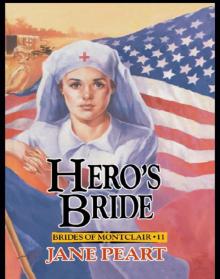 Hero's Bride
Hero's Bride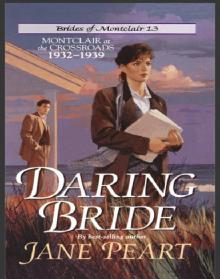 Daring Bride
Daring Bride Runaway Heart
Runaway Heart Promise of the Valley
Promise of the Valley Gallant Bride
Gallant Bride The Pledge, Value
The Pledge, Value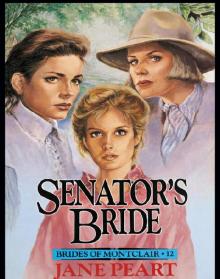 Senator's Bride
Senator's Bride Valiant Bride
Valiant Bride Shadow Bride
Shadow Bride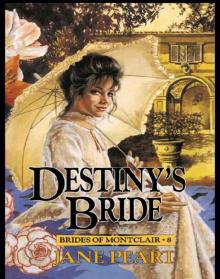 Destiny's Bride
Destiny's Bride A Tangled Web
A Tangled Web Folly's Bride
Folly's Bride The Promise
The Promise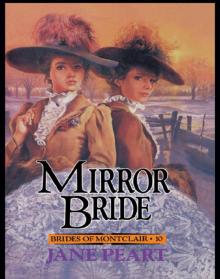 Mirror Bride
Mirror Bride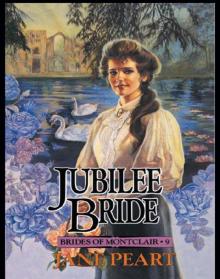 Jubilee Bride
Jubilee Bride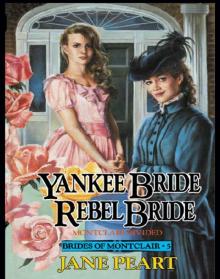 Yankee Bride / Rebel Bride
Yankee Bride / Rebel Bride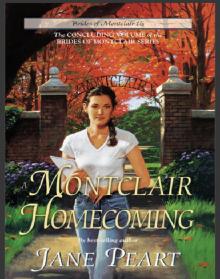 A Montclair Homecoming
A Montclair Homecoming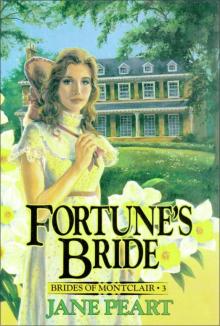 Fortune's Bride
Fortune's Bride Undaunted Spirit
Undaunted Spirit Love Takes Flight
Love Takes Flight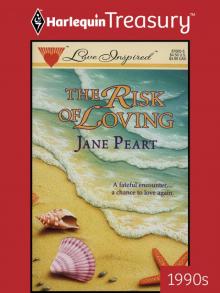 The Risk of Loving
The Risk of Loving The Pattern
The Pattern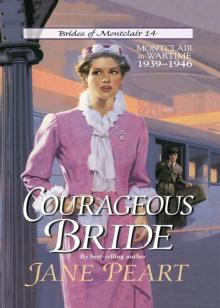 Courageous Bride
Courageous Bride